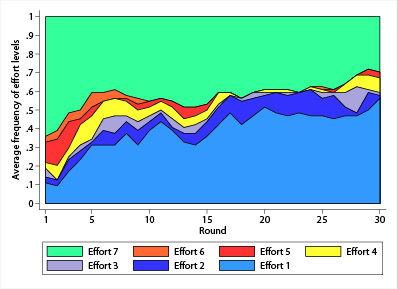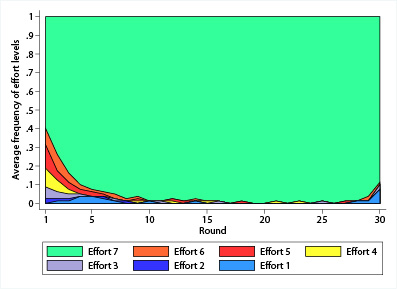How to fight against pandemics, cybercrime and terrorism? - Solving the coordination problem

Many of these more complex coordination problems have a weakest link characteristic, i.e. the weakest person determines the outcome for all involved parties. In such a weakest link game, each person has an incentive to coordinate on high efforts, implying high individual and group welfare, but also faces considerable strategic uncertainty, as only one single individual decreasing its effort suffices to cause substantial losses for all.
 Let’s have a closer look at some examples. Global health governance is a prominent illustration of a weakest link game. In case of preventing a pandemic such as the recent Ebola outbreak, the country with the poorest preventive measures determines the likelihood of an outbreak. As Marc Lipsitch, an infectious disease epidemiologist at Harvard states “It isn’t a coincidence that Ebola got out of control where it did. There is a global dimension. We are vulnerable to things that happen far away. The weakest link in global health affects everyone.”[1] Governments with higher standards can respond not only by lowering their own costly preventive measures but also by restricting trade or travel to and from countries with low standards. During the Ebola outbreak 33 countries around the world implemented travel restrictions related to outbreak including the United States and Australia.[2]
Let’s have a closer look at some examples. Global health governance is a prominent illustration of a weakest link game. In case of preventing a pandemic such as the recent Ebola outbreak, the country with the poorest preventive measures determines the likelihood of an outbreak. As Marc Lipsitch, an infectious disease epidemiologist at Harvard states “It isn’t a coincidence that Ebola got out of control where it did. There is a global dimension. We are vulnerable to things that happen far away. The weakest link in global health affects everyone.”[1] Governments with higher standards can respond not only by lowering their own costly preventive measures but also by restricting trade or travel to and from countries with low standards. During the Ebola outbreak 33 countries around the world implemented travel restrictions related to outbreak including the United States and Australia.[2]
 Similar arguments can be made for the fight against international terrorism. Denying terrorists’ safe haven plays a major role in undermining terrorists' capacity. If all but one country denies terrorists a safe haven on their soil, this holdout undermines the efforts of the others. The overall level of security attained thus depends on the smallest effort exerted by targeted countries. The same holds for airports, the airports with the weakest security, determines the overall aviation safety, insofar as the vulnerable airport is most likely to attract the terrorists. As a reaction, countries might decide to make use of trade embargos against the countries expending lower efforts against the combat of terrorism. One interesting example of such a counter reaction is the List of State Sponsors of Terrorism made by the US. Countries that have repeatedly provided support for acts of international terrorism are put on this list and are being sanctioned by actions such as restrictions on U.S. foreign assistance, and bans on defence exports and sales.
Similar arguments can be made for the fight against international terrorism. Denying terrorists’ safe haven plays a major role in undermining terrorists' capacity. If all but one country denies terrorists a safe haven on their soil, this holdout undermines the efforts of the others. The overall level of security attained thus depends on the smallest effort exerted by targeted countries. The same holds for airports, the airports with the weakest security, determines the overall aviation safety, insofar as the vulnerable airport is most likely to attract the terrorists. As a reaction, countries might decide to make use of trade embargos against the countries expending lower efforts against the combat of terrorism. One interesting example of such a counter reaction is the List of State Sponsors of Terrorism made by the US. Countries that have repeatedly provided support for acts of international terrorism are put on this list and are being sanctioned by actions such as restrictions on U.S. foreign assistance, and bans on defence exports and sales.
Another issue that is receiving more and more attention is the issue of cybercrime. In computer networks hackers or viruses can easily enter through weakly protected computers. Rather than lowering their own costly security standards, network system administrators may choose to restrict access to the others in the network, who do comply with the high security standards. These weakly protected computers are placed in quarantine in a so-called “walled garden” restricting its access but allowing them to services to remediate the protection standards off the network.
The examples show that weakest-link games are ubiquitous in real life. It is therefore important to understand if and when agents are able to coordinate efficiently. Existing experimental research on weakest-link games shows an overwhelming inability of people to coordinate on efficient equilibria, especially in larger groups. Interestingly, these studies focus on settings where economic agents are bound to interact with everybody else. However, in the examples mentioned above, the parties involved -be it countries or individuals- have the possibility to choose their interaction partners, i.e. neighbours. A natural extension is therefore to investigate what the effect of having the possibility to choose ones interaction neighbourhood is on welfare.
In Riedl Rohde and Strobel (2015),[3] we experimentally demonstrate that this freedom has an overwhelmingly positive impact on achieving efficiency in weakest-link games. Players play various versions of repeated weakest-link games, with and without free neighbourhood choice in groups of either size 8 or 24. In the weakest-link game without free neighbourhood choice that is based on the game from Van Huyck, Battalio and Beil (1990)[4] players are forced to play with each other and to simultaneously choose an integer number or “effort level” between 1 and 7, where all choosing 1 is the least efficient Nash equilibrium and all choosing 7 the most efficient Nash equilibrium. The treatment with free neighbourhood choice only differs in that interaction between any two players is endogenous and requires mutual consent. An important aspect of the experimental design which is also present in the examples mentioned above, is that agents may have overlapping interaction neighbourhoods and do not have to choose between mutually exclusive groups and tasks.
In our paper we identify exclusion of low effort providers who in response start providing high effort as the simple but effective mechanism enforcing efficient coordination, even under different information and payoff settings. One could argue that exclusion resembles a costly punishment mechanism and that this form of punishment may indeed be an important force behind the effectiveness of neighbourhood choice. [5] We therefore also test whether the punishment aspect inherent in exclusion is necessary for the mechanism to be effective, by designing a treatment where exclusion does not materially affect the excluded agent. We find that it is not and that `self-protection' from low effort providers, which reduces strategic uncertainty, is sufficient.
Let’s now go back to the examples mentioned earlier. In all these cases, the public as well as politicians often urge for the establishment of costly regulatory mechanisms such as an additional official institute whose sole purpose is to enforce efficient coordination. The findings of our paper suggest that coordination can be achieved without forming such costly institutions. The possibility and threat of exclusion of parties exerting low efforts as well as well as self-protection against these parties in these situations already induces all parties to increase coordination in the long run.
[1] http://news.yale.edu/2015/11/20/emerging-epidemics-experts-discuss-ebola-and-other-infectious-disease-threats
[3] Riedl, A. Rohde, I. M. T. and Strobel, M. (2015). Efficient coordination in weakest-link games. Forthcoming in The Review of Economic Studies.
[4] Van Huyck, J. B., Battalio, R. C., and Beil, R. O. (1990). Tacit coordination games, strategic uncertainty, and coordination failure. The American Economic Review, 80(1): 234–248.
[5] Fehr, E. and Gächter, S. (2000). Cooperation and punishment in public goods experiments. American Economic Review, 90: 980–994.
About the Author
 Ingrid Rohde holds a Ph.D. in Economics at Maastricht University. Since 2011 she is a postdoctoral researcher at the School of Business and Economics at Maastricht University. Her current research focuses on the dynamics of social networks, decisions under risk, and concerns for equality and social preferences.
Ingrid Rohde holds a Ph.D. in Economics at Maastricht University. Since 2011 she is a postdoctoral researcher at the School of Business and Economics at Maastricht University. Her current research focuses on the dynamics of social networks, decisions under risk, and concerns for equality and social preferences.
